Presidential Summer Fellow Emily McCall studies snails, parasitic flatworms in Kenya
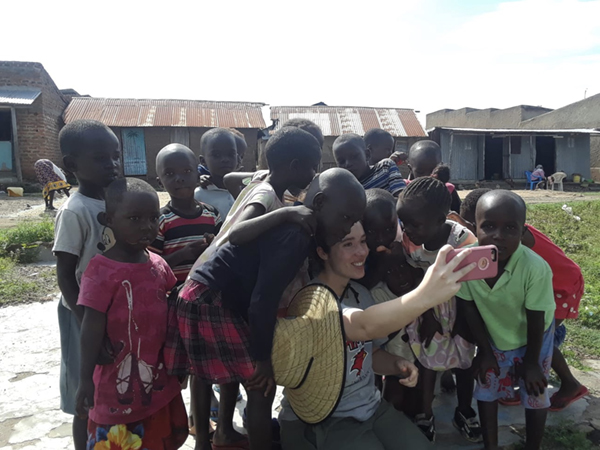 Lamar University junior biology major Emily McCall, of Orangefield, traveled to Africa this summer to participate in field research thanks to a Presidential Summer Fellowship. The Fellowship provided a $10,000 grant to fund her research in Kenya on Schistosoma mansoni and S. haematobium, parasitic flatworms estimated to afflict more than 200 million people worldwide according to the Center for Disease Control and Prevention.
Lamar University junior biology major Emily McCall, of Orangefield, traveled to Africa this summer to participate in field research thanks to a Presidential Summer Fellowship. The Fellowship provided a $10,000 grant to fund her research in Kenya on Schistosoma mansoni and S. haematobium, parasitic flatworms estimated to afflict more than 200 million people worldwide according to the Center for Disease Control and Prevention.
McCall, who plans a career in medicine, worked as part of a research team led by renowned parasitologist Eric Loker, distinguished professor of biology at the University of New Mexico, and their colleagues from the Kenyan Medical Research Institute.
McCall was one of five deserving students who spent some of their summer abroad engaging in research after they were selected in November 2017 for David J. Beck Fellowships and Presidential Summer Fellowship grants.
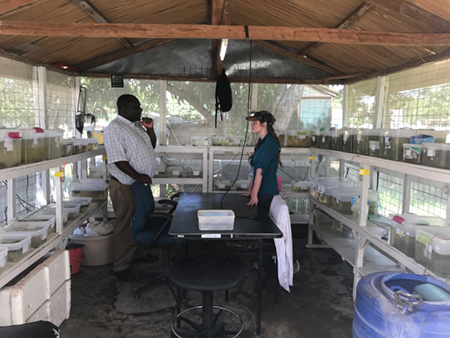 While in Kenya for two weeks, McCall helped collect aquatic snails and prepared samples to be brought back to New Mexico for analysis as part of a long-term study begun by Loker in 1986 showing human infection rates, and locations where the host snails and flatworms are prevalent, McCall said.
While in Kenya for two weeks, McCall helped collect aquatic snails and prepared samples to be brought back to New Mexico for analysis as part of a long-term study begun by Loker in 1986 showing human infection rates, and locations where the host snails and flatworms are prevalent, McCall said.
The team worked to locate areas where there were isolated populations of snails to determine the types prevalent near villages where Schistosomiasis infection rates are high.
The snails being collected are a temporary host for both Schistosoma mansoni and S. haematobium. When they emerge from the host sail, the flatworms can infect people who enter the water to bathe, wash clothes, fish, or engage in other activities.
“At one low water crossing, I saw several guys washing their motorcycles,” she said. “No one must want to walk around in wet shoes, because they were all barefoot.”
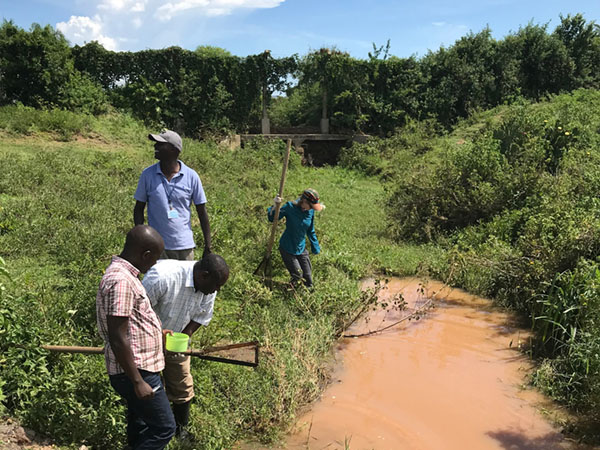 While an infection is treatable, the researchers took precautions by wearing gloves, long sleeve shirts and tall rubber boots, McCall said. If anyone did get splashed, they would rinse their skin with some ethanol.
While an infection is treatable, the researchers took precautions by wearing gloves, long sleeve shirts and tall rubber boots, McCall said. If anyone did get splashed, they would rinse their skin with some ethanol.
Each morning’s collecting required maneuvering a long pole with a sieve attached along the bottom to dredge up snails. McCall would collect any snails, which are typically ½- to an inch-long, and put them in marked containers to take back to the lab.
Because only specific species of snails can serve as hosts, Biomphalaria sudanica and Biomphalaria choanomphala for Schistosoma mansoni and both Bulinus ugandae and Bulinus nasutus for Schistosoma haematobium, the researchers were also interested in the ratio of those species to other snail types in the area.
Knowing the rate of human infection is also vital to the ongoing research, so the team collected stool samples at schools in the area, documented how many students were affected, McCall said. It then could be arranged to get treatment for any children who were infected. “While an infection is easily treated, it is a recurring problem because the flatworms are always in the water,” she said. While the pain and discomfort that an infection causes isn’t debilitating, continual reinfection can lead to serious health issues later in life.
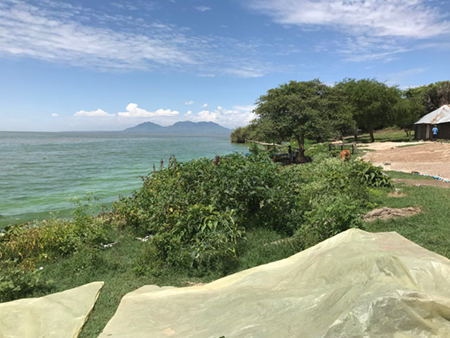 Back at the lab, McCall helped sort the snails where they would be cataloged and then examined for infection. If any were found to be infected, each would be preserved to be sent back to U.S. for DNA testing.
Back at the lab, McCall helped sort the snails where they would be cataloged and then examined for infection. If any were found to be infected, each would be preserved to be sent back to U.S. for DNA testing.
“We would isolate the parasites, identify the species, note the date and the snail they came from,” she said. “Then we would package them to be sent back to the states as well. We preserved a lot of snails and parasites and did a lot of pipetting. In fact, toward the end we ran out of the ethanol we brought and had to find more.”
“This was my first research trip, so I gained a lot of practical field experience,” McCall said. “I learned how to work with colleagues, how to prepare and perform field work, and how to communicate what we were doing with the local population.”
Seeing people, and particularly children, who are affected by an ongoing health problem moved her, she said, it was an experience that would help her be better able to relate to patients as a doctor someday. “It is easy to get stuck in your own experience, but seeing the conditions, the way other people live, gives me greater empathy and understanding,” she said.
As she begins the new semester, McCall plans to seek additional opportunities to engage in undergraduate research at Lamar.
"I am very grateful to Lamar University, the Presidential Summer Fellowship, the Biology Department, and my wonderful project mentor, Dr. H. Randall Yoder (without whom none of this would have been possible - from his inspirational class to his invaluable guidance), for their help in allowing me the chance to travel and help perform Schistosomiasis research along Lake Victoria's coast in Kenya,” McCall said.
“This trip allowed me the opportunity to meet and learn from some amazing people, renowned parasitologist Dr. Eric Loker, Bishoy Kamel Hanna and Caitlin Babbitt from the University of New Mexico, with whom I traveled and helped perform research, and their great colleagues Ibrahim Mwangi, Martin Mutuku, and Gerald Mkoji from the Kenyan Medical Research Institute, who were essential to our success.”
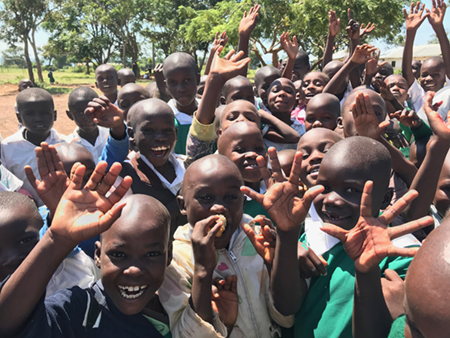 McCall is recipient of the M.L. Lefler, Sr. and Bessie Lefler Memorial Scholarship, the McMaster Honors Scholarship, and the Orange Memorial Hospital Corporation Scholarship. In addition to her ambitious academic plans, McCall is also heavily involved in on-campus organizations including the LU Ambassadors, the Honors Student Association, and Cardinals Beyond Borders. She is also an ongoing volunteer at the Shorkey Center, an organization that strives to meet the diverse therapy and rehabilitation needs of children in Southeast Texas.
McCall is recipient of the M.L. Lefler, Sr. and Bessie Lefler Memorial Scholarship, the McMaster Honors Scholarship, and the Orange Memorial Hospital Corporation Scholarship. In addition to her ambitious academic plans, McCall is also heavily involved in on-campus organizations including the LU Ambassadors, the Honors Student Association, and Cardinals Beyond Borders. She is also an ongoing volunteer at the Shorkey Center, an organization that strives to meet the diverse therapy and rehabilitation needs of children in Southeast Texas.
“The Shorkey Center is, hands down, my favorite place to volunteer. I’ve really gotten attached to the kids, and seeing them is easily one of the highlights of my week,” said McCall.
McCall plans to start applying to medical schools this summer, and plans to focus on schools in Texas. She hopes to eventually earn a residency in orthopedic surgery or in pediatrics, but she still hasn’t decided what specialty she wants to pursue, but believes her experiences in medical school will help her decide. Additionally, because of her previous experiences with Lamar’s study abroad programs and her trip to Kenya, McCall says she is seriously considering practicing abroad when she finishes medical school.
For more information about the David J. Beck Fellowship, visit https://www.lamar.edu/forms/academic-affairs/david-beck-fellowship/index.html

